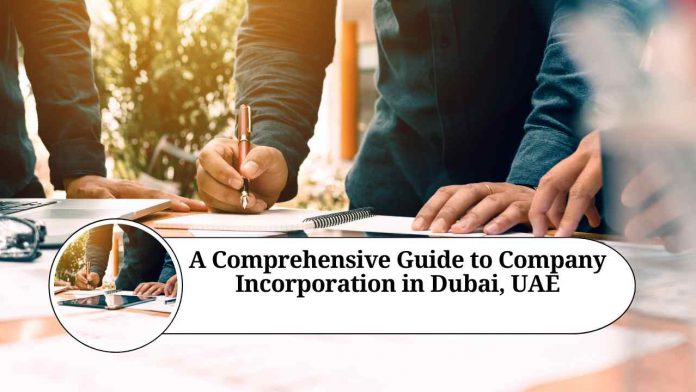Company Incorporation in Dubai
Dubai, a vibrant city in the United Arab Emirates (UAE), has become a global hub for business and entrepreneurship. Its strategic location, tax advantages, and excellent infrastructure make it an attractive destination for companies looking to establish a presence in the Middle East. In this comprehensive guide, we will explore the process of company incorporation in Dubai, highlighting key steps, legal requirements, and the benefits of setting up your business in this thriving metropolis.
- Choosing the Right Business Entity: Before diving into the company incorporation process, it is crucial to determine the most suitable business entity for your venture. Dubai offers several options, including:
- Free Zone Company: Free zones are designated areas with unique tax and legal frameworks. They offer 100% foreign ownership, exemption from customs duties, and simplified incorporation procedures. Popular free zones in Dubai include Dubai Multi Commodities Centre (DMCC), Dubai Internet City, and Jebel Ali Free Zone (JAFZA).
- Mainland Company: Establishing a mainland company allows you to conduct business anywhere in Dubai without restrictions. While it requires a local Emirati partner or sponsor, certain professional and industrial activities allow for 100% foreign ownership through a professional license or a civil company.
- Offshore Company: Offshore companies are mainly used for holding assets, investments, and international trading. They offer privacy, tax optimization, and flexibility in currency usage. Jebel Ali Free Zone Authority (JAFZA) and Ras Al Khaimah International Corporate Centre (RAKICC) are popular offshore jurisdictions in Dubai.
- Meeting Legal Requirements: To incorporate your company in Dubai, you must fulfill specific legal requirements, including:
- Choosing a company name: Select a unique and appropriate name for your business that complies with the guidelines set by the Department of Economic Development (DED) or relevant free zone authorities.
- Obtaining necessary licenses: Depending on your business activity, you may need to acquire specific licenses from the relevant authorities. These licenses can vary based on the nature of your business, such as commercial, professional, industrial, or tourism-related.
- Securing office space: A physical office space is typically required for mainland companies. Free zone companies may offer flexible options such as flexi-desks, shared offices, or virtual offices.
- Drafting legal documents: Prepare the Memorandum of Association (MOA) or the Articles of Association (AOA), depending on the chosen business entity. These documents outline the structure, shareholders, and activities of your company.
- Visa and immigration requirements: Companies in Dubai can sponsor visas for employees, so familiarize yourself with the visa categories and the procedures for obtaining work permits and residency visas.
- Engaging with Local Partners: If you decide to establish a mainland company, you will need to engage with a local Emirati partner or sponsor. This sponsor will own at least 51% of the shares, although arrangements can be made to protect the rights and interests of foreign investors. It is essential to choose a reliable and trustworthy local partner to ensure a successful partnership.
- Engaging with Professional Services: Navigating the company incorporation process in Dubai can be complex, which is why engaging with professional services is highly recommended. Consultants, business setup firms, and law firms specializing in company formation can assist you with paperwork, legal requirements, and liaising with government authorities. Their expertise can streamline the process and save you valuable time and resources.
Benefits of Incorporating in Dubai:
- Strategic location: Situated at the crossroads of Europe, Asia, and Africa, Dubai provides excellent access to global markets.
- Tax advantages: Dubai has a business-friendly tax system with no personal or corporate income taxes in most cases. Additionally, free zones offer exemptions from customs duties
Conclusion
Company incorporation in Dubai, UAE presents an exciting opportunity for entrepreneurs and businesses seeking to expand their operations in the Middle East. With its favorable business environment, strategic location, and robust infrastructure, Dubai has become a global hub for trade and investment. By carefully selecting the right business entity, meeting legal requirements, engaging with local partners, and seeking professional assistance, entrepreneurs can navigate the process smoothly and establish a successful presence in this dynamic city.
Frequently Ask Question
Q. What are the main types of business entities available for company incorporation in Dubai?
The main types of business entities in Dubai include Free Zone Companies, Mainland Companies, and Offshore Companies.
Q. What are the advantages of setting up a company in a Dubai Free Zone?
Free zones in Dubai offer 100% foreign ownership, tax exemptions, streamlined incorporation procedures, access to world-class infrastructure, and the ability to repatriate 100% of capital and profits.
Q. Can I have 100% ownership of a mainland company in Dubai?
Certain professional and industrial activities allow for 100% foreign ownership through a professional license or a civil company. However, most mainland companies require a local Emirati partner or sponsor who holds at least 51% ownership.
Q. What licenses are required to operate a business in Dubai?
The licenses required depend on the nature of the business activity. Common licenses include commercial licenses for trading activities, professional licenses for service-based activities, industrial licenses for manufacturing activities, and tourism licenses for tourism-related businesses.
Q. Can I operate my business outside the free zone if I set up a free zone company?
Free zone companies are generally required to operate within the free zone area. However, some free zones allow companies to have a presence outside the free zone through a branch or representative office.




















